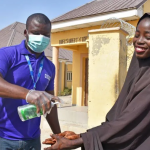On Kenyan coastal beaches, flip-flop sandals are discarded in the sand, rocks or water. The washed-up plastics threatening the beaches are now being upcycled and transformed into unique sculptures and colourful toys.
Since 2006, a group of women and girls from Kilifi County in Kenya have collected washed-up flip-flops along the Indian Ocean weekly.
The collected trash is then transported to a workshop in the capital city, Nairobi, where artists and wood sculptors carve out various animals for sale.
“We have trucks that transport the flip flops from the Coast, and once they’re received at the workshop in Nairobi, they’re washed and dried before our artists can use them.
We have a dry-cut machine for the small pieces that cut a rhino, an elephant or any other animal template. Those templates are then joined into a block and carved into a sculpture of the animal,” explained Joe Mwakiremba, the head of sales at Ocean Sole.
Ocean Sole is a social enterprise launched in 1999 to turn the Earth’s flip-flop pollution into inspiring art.
After the founder of Ocean Sole, Julie Church, witnessed children making toys out of flip-flop material, she had a light bulb moment.
She began working with a group of women from Kilifi County to collect washed-up flip-flops along the ocean weekly and earn an equivalent of 30 cents US dollars per kilogram. In this way, the ocean is kept clean, and the communities can put food on their table with dignity.
The animal sculpture-making process is customised depending on the animal’s size. For the small ones, only flip flops are used, while big animals are stuffed on the inside with polyutherane; a foam-like material often used for cushioning products shipped into designated countries.
They’re then padded on the outside using recycled flip-flops.
Mwakiremba further explained that not a single piece of the recycled material goes to waste as the small pieces of rubber left over after the sculptures have been carved – also known as ‘off-cuts’- are further shredded and used to make mattresses, dog beds and poofs.
The finished products are then sold in local markets and overseas.
“We sell to zoos, aquariums, museums and gift shops all over the world, mainly in the USA and European markets. We also sell locally to walk-in customers though 90 percent of our production is for export,” he said.
Ocean Sole says they recycle 638 tonnes of flip-flops and 600 trees yearly.
The enterprise, like any other, faces its own set of challenges, with the main one being counterfeiting.
“Some people come here and try to imitate what we do and when the fake product goes to the market and there are complains, we’re forced to go out and clear our name,” Mwakiremba explained.
However, he reiterates that the mission of Ocean Sole is not purely to make profits but rather to keep the ocean clean and to empower local communities.
“Proceeds from the sale of sculptures are invested in educating children in high impact communities so as to foster awareness on the negative effects of plastic pollution to the environment in the long term“, Mwakiremba said.
The initiative has impacted the coastal region’s local communities and transformed the lives of sculptors who used to make wooden carvings.
The enterprise has empowered over 1,000 Kenyans through the collection of flip-flops and direct employment.
David Kaloki has been working with Ocean Sole since 2013.
“Making wooden carvings was very tedious. It would take up a lot of time and was destructive to the environment but using recycled flip flops to make the same sculptures is much easier and is also friendly to the environment. I’m also able to meet the needs of my family because I have a job unlike when I was a wood carver,” he explained.
The story is the same for Florence Auma, who joined the company as a cleaner in 2006 but quickly learnt the craft and joined the male-dominated carving world. She is also a recycling ambassador who carries the message to her neighbourhood.
“Nowadays I mobilise people in my neighbourhood to keep their old flip flops in a gunny bag until we have collected enough to sell. That way, we keep our environment clean and the ocean and waterways habitable for marine animals,” she said.
Despite this noble course, critics argue that recycling alone cannot solve the challenge of plastic pollution in the larger scheme of things.
According to Daniel Maina, an environmentalist from Kisiwani conservation network – a community-based organisation operating in Kenya’s coastal region – out of the eight to ten million metric tonnes of plastics collected from the ocean annually, only one per cent is recycled.
At the same time, a huge chunk is burnt, emitting toxic gasses that contribute to global warming.
Maina noted that long-term solutions lie in banning plastics entirely or generating some that are bio-degradable.
“In the meantime we still need plastics; our phones, computers and cars still contain plastic and there are medicines that can only be packed in plastic bags. Perhaps we should look for more sustainable ones in the long term,” Maina said.
He added that some people have prototypes of low-density plastic bags from the sap of the pear cactus that are bio-degradable, which could be a viable option.
bird story agency





